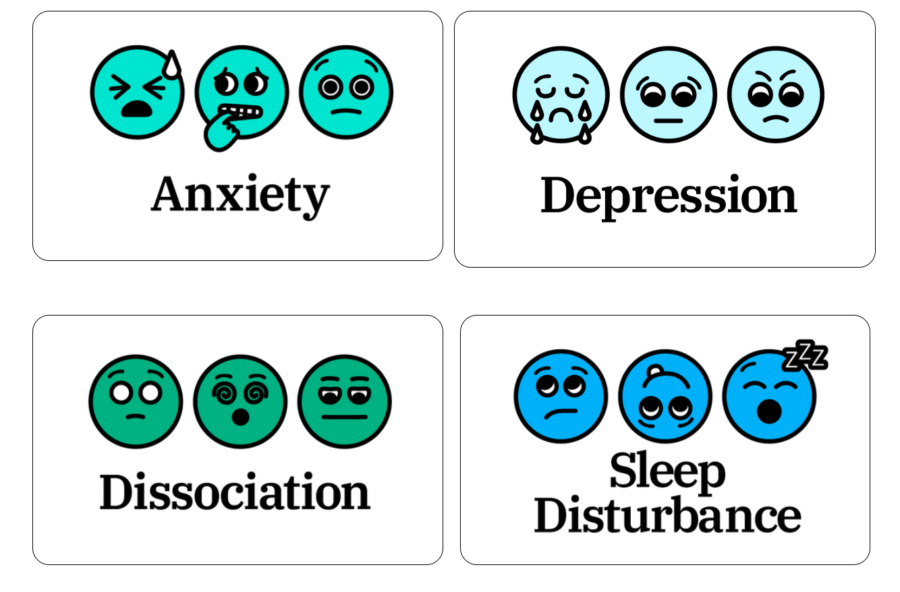Snapshot of the Mental Health Warriors webpage.
Mental health takes toll during pandemic, study finds. This resource helps students cope
June 10, 2023
Struggles with mental and emotional well-being shot up during the COVID-19 pandemic, and a study by College of Health and Human Services faculty members Dr. Rebecca Elkins and Dr. Rhyanne McDade has painted the extent of the struggles among NKU students.
Elkins and McDade conducted a study on how the pandemic impacted the mental health of NKU students, finding that the majority of NKU students experienced symptoms of mental health distress during the height of the pandemic and the ensuing online learning environment. The pair of scholars have developed an online resource called Mental Health Warriors to help students identify and address mental health concerns to improve emotional well-being.
A survey by Best Colleges found 95% out of 702 respondents, all of whom were college students across the US, experienced at least one negative mental health symptom as a result of the pandemic, such as social isolation, anxiety and lack of focus.
Initially curious about how the pandemic affected the student learning experience at NKU, Elkins and McDade conducted a study in late 2020 and into 2021. They found an alarming number of NKU students reporting an array of mental health issues stemming from pandemic-induced circumstances impacting their learning experience and daily lives, Elkins said.
“Everyone was struggling but a lot of students were reporting mental health issues. Issues with teachers and hoping they would be more supportive of the things that were coming up related to COVID,” Elkins said.
This finding prompted Elkins and McDade to narrow the scope of their research to focus on mental health concerns related to the pandemic among NKU students in 2021 and 2022. Using a mix of qualitative and quantitative data gathering techniques—including a survey of nearly 600 students—they found that over 90% of NKU students were experiencing some form of psychological distress.
Among the top forms of psychological distress found in students were anxiety, depression, sleep disturbance and dissociation, they said.
Elkins and McDade noted that the study findings are not diagnostic, but they indicate that a majority of students displayed signs of these overarching mental disturbances.
Dysregulated sleep routines—like struggling to sleep or oversleeping—faulty memory, difficulty focusing and disconnection from reality are examples students reported of how their psychological distress manifested, according to study data.
Part of this research’s mission was to develop a system for students to identify their mental health distress symptoms and to provide resources and coping strategies. In response to their findings, Elkins and McDade designed an online resource called Mental Health Warriors to improve student mental health literacy.
The website includes simple and accessible techniques to mitigate the four forms of mental distress the study found to be most prominent: anxiety, depression, sleep disturbance and dissociation. The website also includes links to the National Alliance on Mental Illness and crisis hotline for additional support and resources.
“This resource can be something that’s more normalized. Like, ‘hey, we’re all dealing with stuff, check out the Mental Health Warriors site,’ you know, this is where you go to,” McDade said.
Although the stark portion of students presenting symptoms of mental distress is concerning, Elkins and McDade agreed that the rise has increased awareness about how mental health crises impact swaths of people across the country.
Elkins has seen this first hand in her own classroom. In the past, a student expressing that mental health was interfering with their learning outcomes would be worrying, Elkins said. When students come forward with these issues today, the matter is still treated with care, but there has been an apparent shift in openness surrounding mental health. Elkins sees more students willing and comfortable professing these sorts of hardships and asking for accommodations to help them overcome their adversity while remaining on track academically.
“I’ve always tried to be responsive and supportive as much as I could be to students. But with that said, I definitely have had more students willing to open up and share when they’re struggling,” Elkins said.

